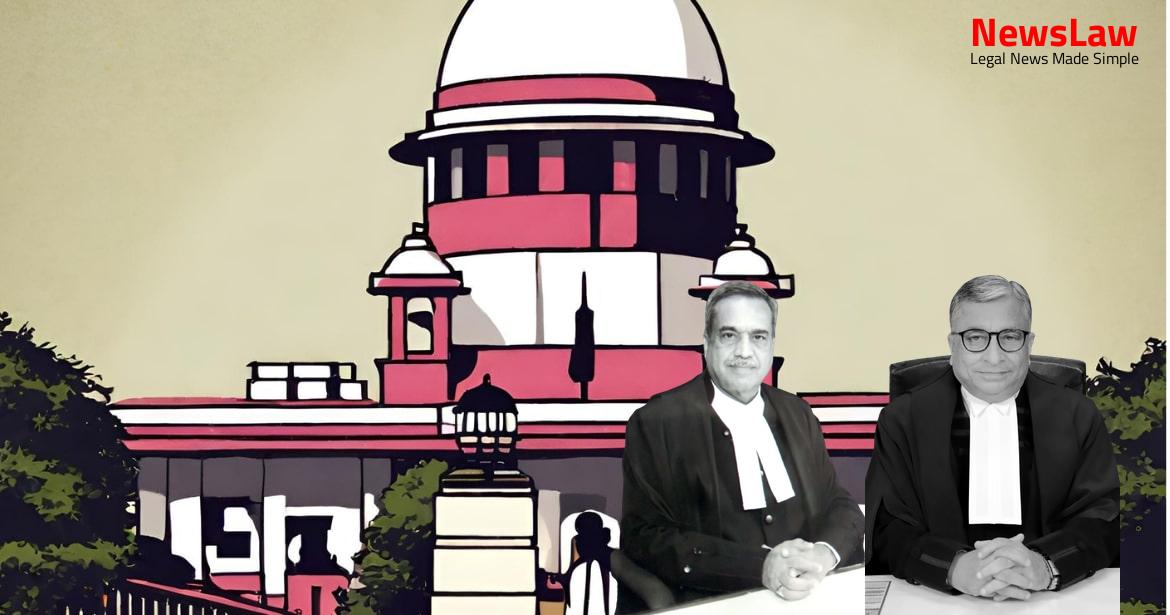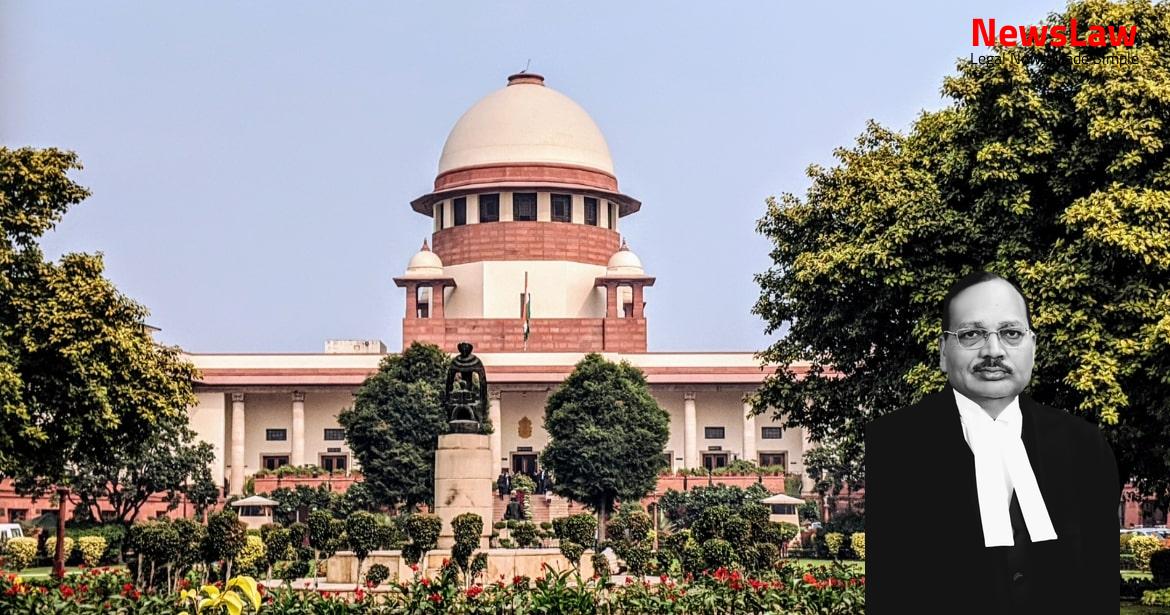Delve into the critical examination of legal analysis and jurisdiction as seen in a recent case dismissal. The court’s thorough scrutiny of factual disputes and writ jurisdiction reveals the intricacies of legal proceedings. Understanding the nuances of these concepts is essential for a comprehensive view of the legal system.
Facts
- The appellant-Bank denied the allegation of transfer of proceeds of two cheques to the loan account.
- The writ application of the petitioner cannot be dismissed on the technical objection made by the respondent bank.
- The Accountant transferred a total amount of Rs.15,03,000 to the loan account, whereas the outstanding dues in the loan account were only Rs.13,386/- up to 14.02.1990.
- The writ petitioner’s son needed immediate treatment for cancer at All India Institute of Medical Sciences, New Delhi.
- An agreement dated 27.05.1990 was created between the parties acknowledging the liability of the bank to the writ petitioner.
- The bank denied the deposit of Rs.14,93,000 in the savings account of the respondent No. 1 or its transfer to the loan account.
- An internal inquiry by the Regional Manager noted discrepancies in the claim made by respondent No. 1.
- The Division Bench heard the matter through LPA No. 310/2009 filed by the appellant-Bank contesting the money claim set by respondent No. 1.
- The bank refuted the existence of the alleged agreement dated 27.5.1990, claiming it to be forged.
- The writ petitioner sold gold jewellery to meet medical expenses for his son’s treatment.
- The Division Bench of the High Court of Judicature at Patna dismissed the LPA filed by the appellants, affirming the decision of the single Judge.
- Background facts leading to the filing of the writ petition by respondent No. 1 were noted by the Division Bench.
- Respondent No. 1 sought a direction for the appellant-Bank to pay his lawful admitted claims as per the agreement dated 27.5.1990 and deposit income-tax papers immediately.
- The writ petitioner had taken a term loan of Rs.10,000 from Punjab National Bank for his business ‘Sanjeev Readymade Store’.
- The loan amount was disbursed in two instalments of Rs.4,000 and Rs.6,000 on specific dates in 1984.
Also Read: Land Acquisition Challenges for Integrated Infrastructure Project
Arguments
- The appellant-Bank disputed the transactions and documents in question, seeking relief through a writ petition.
- The Division Bench dismissed the Bank’s appeal after considering the proceedings and certified copies of documents submitted by the respondent.
- The Bank raised objections on various grounds, including disputed factual matters and lack of jurisdiction of the District Magistrate.
- Affidavits were filed by District Magistrate and District Coordination Officer denying involvement and authenticity of the documents in question.
- The Division Bench noted the Bank’s argument on the complexity of factual matters not suitable for writ jurisdiction.
- The grievance of the appellant-Bank was based on the plea that the matter required detailed examination beyond the scope of writ jurisdiction.
- The agreement was executed between the parties on 27.5.1990 and the Bank cannot resile from it.
- The existence of the agreement was confirmed in the enquiry where Bank officials supported its genuineness.
- The respondent No 1’s claim was indisputable due to the admission of liability by the appellants.
- The respondent No 1 urged for dismissal of the appeal, as the claim was legitimate.
- The single Judge of the High Court was justified in allowing the writ petition based on valid reasons.
- No inference by this Court is warranted, considering the circumstances and victimization of respondent No 1.
- It would be unfair and unjust to compel the respondent to file a suit for enforcement of the agreement after this long period of time.
Also Read: Analysis of Legal Issues in Property Dispute Case
Analysis
- The judgment emphasizes that a writ petition under Article 226 is distinct from a suit and should not be treated as such.
- The High Court retains jurisdiction even when factual issues need determination in considering relief for the petitioner.
- The court must consider the nature of the proceedings and relief sought when applying the provisions of the Code to non-suit proceedings.
- The High Court failed to properly assess the complex factual aspects of the case which could not be resolved through writ jurisdiction.
- The appellant-Bank’s stance denying the existence of the agreement was supported by affidavits and reports, which was not appropriately considered by the court.
- The High Court’s disposal of the writ petition lacked detailed analysis of the relevant documents and the appellant’s denial of the agreement.
- The Court’s jurisdiction under Article 226 of the Constitution should be exercised judiciously and not as an alternative to statutory remedies.
- The Court should not adjudicate complex factual issues in a writ petition, especially when oral evidence may be necessary.
- The High Court should not assume the genuineness of documents when the appellant disputes their validity through affidavits.
- The appellant-Bank’s denial of the agreement’s existence and genuineness should have been given more weight by the Court.
- The judgment also highlights the discretion of the High Court in determining the maintainability of a writ petition based on the existence of alternative remedies.
- The Division Bench’s endorsement of the single Judge’s decision was flawed as it did not consider the appellant’s strong denial supported by evidence.
- The High Court has the discretion to decide disputed questions of fact on sound judicial principles.
- Petitions solely requesting a refund of money from the State through a writ of mandamus are not typically entertained.
- High Court can try issues of fact and law in a petition under Article 226, but may decline if the dispute is not suitable for a writ petition.
- The jurisdiction under Article 226 should be exercised on sound judicial principles.
- High Court can reject petitions if they are frivolous, not maintainable, or involve disputes not suitable for writ jurisdiction.
- In cases where complex questions of fact are involved, requiring oral and documentary evidence for determination, a refund of money claim against the State is not appropriate for writ jurisdiction.
- Dismissal of a petition in limine can be justified for various reasons like frivolity, nature of claim, maintainability, or inappropriate dispute for writ jurisdiction.
- The case will be decided based on its own merits.
- The decision will be made in accordance with the law.
- The judgment will not be influenced by any observations on factual matters made in the impugned judgment or this judgment.
Also Read: Legal Analysis on Levy of Customs Duty on Non-Excisable Goods Sold in Domestic Tariff Area by an EOU
Decision
- The appeal succeeds and the impugned decisions are set aside.
- The writ petition filed by respondent No 1 is dismissed with liberty to pursue alternative remedies.
- No costs are awarded in this case.
- All contentions are left open for both parties to proceed as per law.
- If false statements on oath are found, recourse can be taken against respondent No 1.
Case Title: PUNJAB NATIONAL BANK Vs. ATMANAND SINGH (2020 INSC 387)
Case Number: C.A. No.-002410-002410 / 2020



